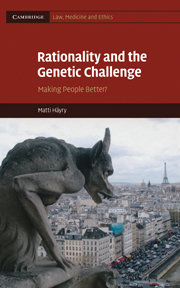Book contents
- Frontmatter
- Contents
- Preface
- 1 Seven ways of making people better
- 2 Rational approaches to the genetic challenge
- 3 The best babies and parental responsibility
- 4 Deaf embryos, morality, and the law
- 5 Saviour siblings and treating people as a means
- 6 Reproductive cloning and designing human beings
- 7 Embryonic stem cells, vulnerability, and sanctity
- 8 Gene therapies, hopes, and fears
- 9 Considerable life extension and the meaning of life
- 10 Taking the genetic challenge rationally
- Bibliography
- Index
2 - Rational approaches to the genetic challenge
Published online by Cambridge University Press: 05 July 2014
- Frontmatter
- Contents
- Preface
- 1 Seven ways of making people better
- 2 Rational approaches to the genetic challenge
- 3 The best babies and parental responsibility
- 4 Deaf embryos, morality, and the law
- 5 Saviour siblings and treating people as a means
- 6 Reproductive cloning and designing human beings
- 7 Embryonic stem cells, vulnerability, and sanctity
- 8 Gene therapies, hopes, and fears
- 9 Considerable life extension and the meaning of life
- 10 Taking the genetic challenge rationally
- Bibliography
- Index
Summary
In this chapter, I present the main normative approaches to the ethics of genetics. I describe the views of six prominent authors in the field and contrast their prescriptive positions with my own nonconfrontational notion of rationality.
Six authors, three approaches
The dimensions of the ‘genetic challenge’ have been intensively studied in recent literature on philosophical bioethics. The conclusions drawn by different authors vary considerably. Some say that all scientific and clinical advances in the field should be embraced and that regulation must in all cases be kept to a minimum. Others contend that the development and application of the new interventions devised by life scientists ought to be viewed with suspicion and in many cases halted or banned. More middle-of-the-road authors have suggested that since the promises are attractive and the threats alarming, sensitive regulation is needed to achieve a balance between the prospects and risks of the process.
In this chapter, I am more interested in the methods by which authors have reached their conclusions than in the conclusions themselves. I have chosen for closer scrutiny the approaches of six prominent scholars in bioethics: Jonathan Glover, John Harris, Leon Kass, Michael Sandel, Jürgen Habermas, and Ronald Green. By this choice I do not mean to imply that the work of others is any less significant – I will return to their arguments and views in the following chapters. Rather, I have made this particular selection because the three most interesting approaches to contemporary applied ethics are admirably represented, if not always thoroughly explicated, in the contributions of these six seminal authors.
- Type
- Chapter
- Information
- Rationality and the Genetic ChallengeMaking People Better?, pp. 24 - 51Publisher: Cambridge University PressPrint publication year: 2010

